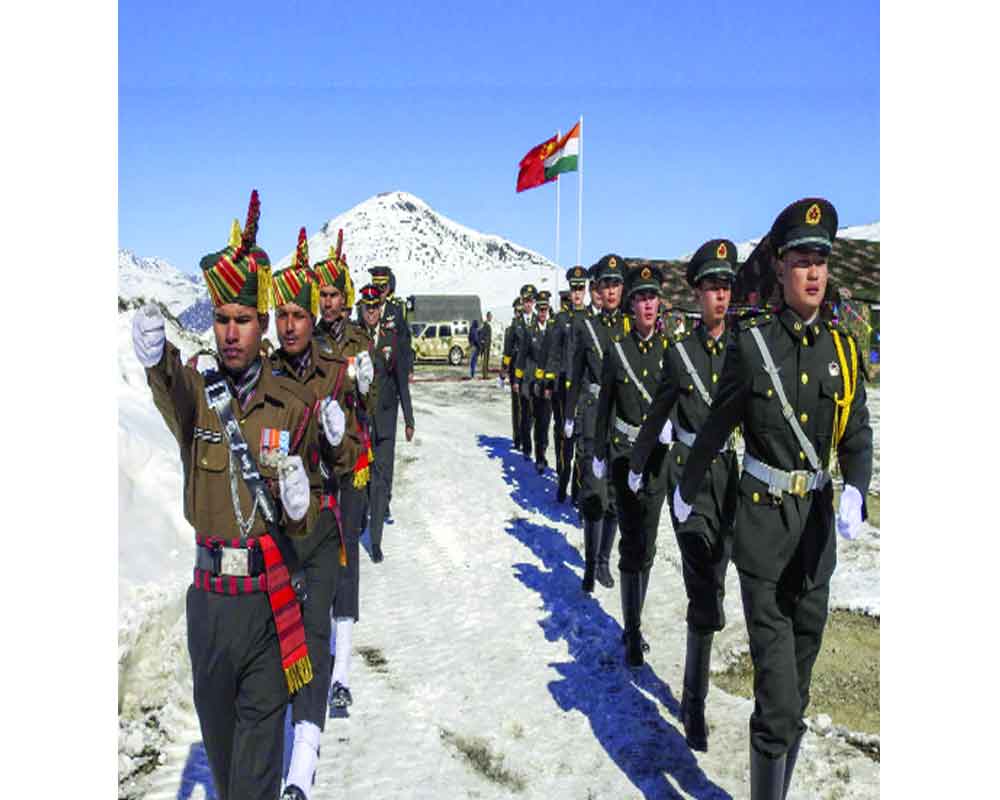Despite all our aggressive posturing and chest-thumping, humble pie seems to be our favourite dish, at least when it comes to China
Mark Twain once wrote, “An uneasy conscience is a hair in the mouth.” It appears General Naravane, the former Chief of Army Staff, is extremely keen to get that hair out of his mouth. He has done so by penning his memoirs, “Four Stars of Destiny”, due out shortly if cleared by the Government.
If the few excerpts that have been published are any indication, he appears to shed fresh light on both, the much-touted Agnipath Scheme and the ongoing confrontation with China in Eastern Ladakh. It has most certainly let the cat out among the pigeons, and in many ways, sheds light on why our government’s response to Chinese belligerence has been so passive, timid and restrained. Both events may also very well have been responsible for his non-selection as the Chief of Defence Staff (CDS), after the tragic demise of General Rawat, despite being the senior most amongst the Service Chiefs
Of course, the latter may be pure speculation, because in appointing General Chauhan as CDS, this government has displayed either utter ignorance or a complete lack of sensitivity to how the military process works or the importance of seniority. Thereby, immense damage has been done to the sanctity of the chain of command. The playing of favourites by manipulating service rules and superseding Service Chiefs has not done the incumbent any favours either. His credibility has come under question and that of his appointment is seriously damaged. This lack of cohesion within the upper echelons of our military is reflected in the lack of progress towards theatrization and jointness.
There are times when those in government, especially at the highest levels, are forced to implement their political masters’ policies or directions that they may personally not agree with. Generally, in such circumstances, objections are placed on record during discussions, but once a lawful decision has been given, it becomes their duty to implement it to the best of their abilities. The dilemma that arises is when the government servant is convinced that the directions to be implemented will have debilitating consequences on the organisation or the country and it would be unconscionable to implement them. In such circumstances, it would be their moral obligation to go public with their objections and refuse to implement them, regardless of their impact on their career.
About the Agnipath Scheme, the General admits he was taken aback when his similar, but extremely limited, proposal, “The Tour of Duty” Scheme, was enlarged and pushed through by the PMO for universal application, without the acquiescence of the Service Chiefs. If unconfirmed reports are correct that he had put his misgivings and objections on record to the MOD and therefore paid the price for it, then his relief, General Manoj Pande, has much to answer for.
Undoubtedly, it is a poorly conceived scheme that has had a debilitating impact on the Army’s capabilities. The fact that the present Chief and the chain of command were aware of its flaws and yet did not back General Naravane speak poorly of their moral courage. They now find themselves in the impossible position of having to cover up the flaws by not exposing the Agniveers to any kind of danger, a ridiculous situation indeed.
As regards the confrontation in Eastern Ladakh, it seems rather intriguing that the Government was given feedback by the Army Chief on the aggressive moves being undertaken by the Chinese, it was left to the Raksha Mantri, no doubt after telephonic discussions with the PM and NSA, to convey to the General to act as he thought necessary. As General Naravane himself points out “I was handed a hot potato. With this carte blanche, the onus was now totally on me.” As events transpired, it is quite clear that the General preferred to tread with caution and was unwilling to take any robust measures to regain lost ground to avoid provoking Chinese escalation. Though it seems purely in the realms of sheer wishful thinking if one believes that if escalation suited the Chinese, they would await a provocation by us!
Our civilian leadership seems unaware of the dictum “wars are too important to be left to generals”. In any case, how can all responsibility be thrust on any one individual? Isn’t that the very reason that we have institutions and processes in place for the higher direction of war? Shouldn’t all this have been in the purview of the Cabinet Committee on Security (CCS)? Shouldn’t it have been convened to take formal cognizance of the prevailing situation, obtain assessments, discuss contingencies and options and give clear-cut directions to the military? Sadly, the impression given is that as events took a turn for the worse, everyone who mattered was intent on passing the buck. Despite all our aggressive posturing and chest-thumping, humble pie seems to be our favourite dish, at least when it comes to China.
(The author, a military veteran, is a visiting fellow with the Observer Research Foundation and a senior visiting fellow with The Peninsula Foundation, Chennai, views are personal)


























